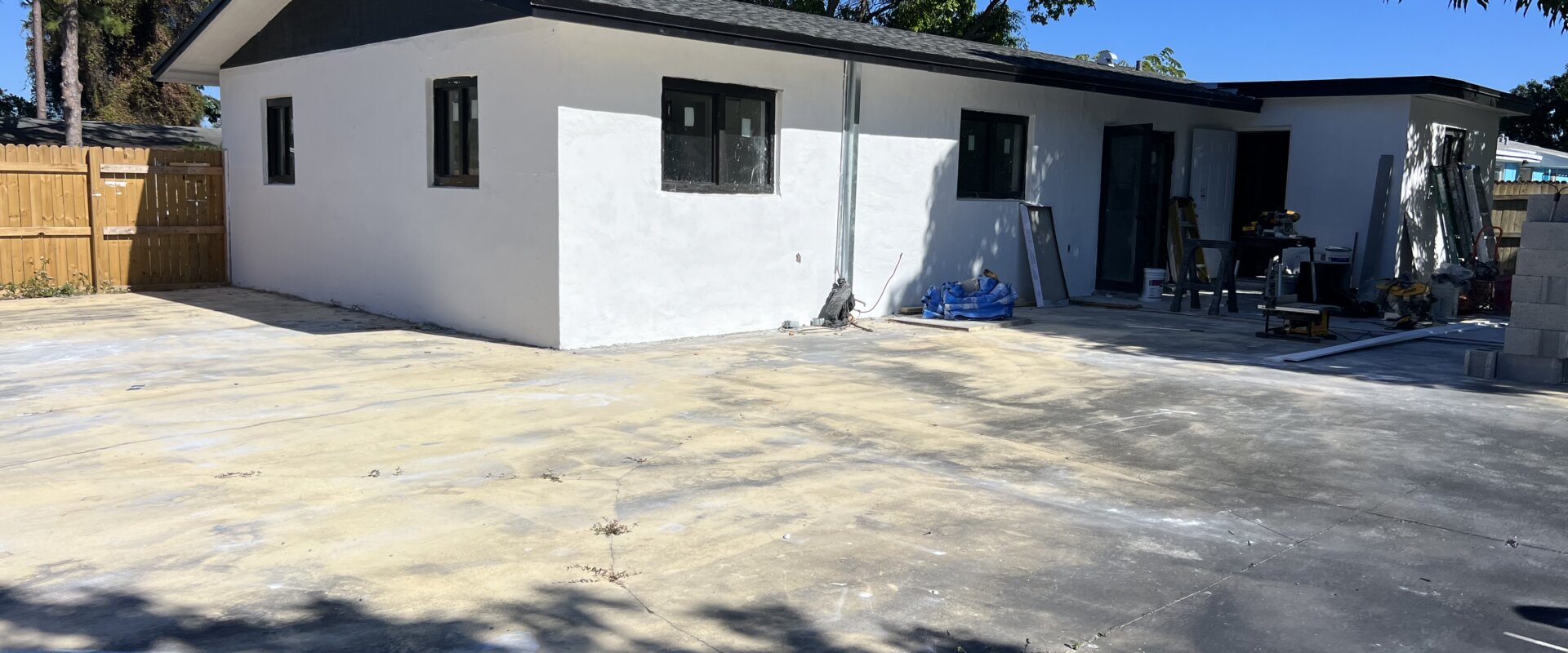Selling a house with unpermitted work can be a challenging process for homeowners in Florida. Unpermitted work includes renovations, additions, or alterations completed without the required permits from local authorities. Selling a home with permit issues can complicate the transaction, especially when addressing legal considerations for selling with open permits or preparing disclosures for open permits in home sales.
Understanding how to resolve open permits when selling a house is essential to preventing delays and ensuring a smoother process. Ignoring permits affecting home sale timelines can result in complications for buyers, including the risks of buying a house with open permits. Successfully managing open building permits and title transfer is key to avoiding setbacks. For the best results, leverage real estate tips for unresolved permits to effectively navigate these challenges and streamline your sale.
Whether it’s a finished basement, an added bathroom, or a modified kitchen, unpermitted work can complicate the selling process. Selling a home with permit issues requires navigating the permitting process while addressing legal considerations for selling with open permits. This guide will provide everything you need to know about how to resolve open permits when selling a house, including steps on how to check house permits and how to legalize unpermitted work.
We’ll also cover disclosures for open permits in home sales, the consequences of unpermitted residential work, and strategies for selling a home with unfinished permit work. Additionally, you’ll gain insight into permits affecting home sale timelines, managing open building permits and title transfer, and understanding potential costs. For further assistance, consult real estate tips for unresolved permits to navigate these challenges and ensure a smoother selling process.
How to Get a Permit After Work Has Been Done

Assess the Situation
The first step to obtaining a permit for work already completed is to evaluate the extent of the unpermitted modifications. This includes identifying any alterations, additions, or improvements made without the necessary permits. A thorough inspection by a licensed contractor or home inspector can reveal unpermitted work. Utilizing resources on how to check house permits ensures you have a comprehensive understanding of what needs to be addressed.
Enlisting the help of a licensed contractor or architect is invaluable for assessing unpermitted work and providing expert advice on how to legalize unpermitted work to meet code requirements. They can assist with preparing documentation and navigating the permitting process.
Addressing how to resolve open permits when selling a house early is crucial to prevent potential delays during the sale. Being aware of legal considerations for selling with open permits and following real estate tips for unresolved permits can make the process more efficient. Additionally, understanding permits affecting home sale timelines and handling open building permits and title transfereffectively will help ensure a seamless transaction.

Contact the Local Building Department
Contact your local building department to address your situation and begin the process of resolving open permits. They can offer guidance on how to legalize unpermitted work by submitting detailed plans of the completed projects and scheduling necessary inspections. Understanding how to resolve open permits when selling a house is essential to avoiding delays and ensuring compliance. Addressing permits affecting home sale timelines early on can simplify the process, while following real estate tips for unresolved permits will help you stay on track. Proper documentation and inspections are key to navigating open building permits and title transfer efficiently.

Prepare Documentation
Create comprehensive plans and specifications for the unpermitted work. These documents should precisely reflect the completed projects and incorporate any required updates to comply with current building codes. Collecting all relevant documentation is an essential part of how to legalize unpermitted work. This includes detailed drawings, plans, and specifications of the completed changes. Understanding how to resolve open permits when selling a house can help you avoid delays and complications.
If available, retrieve original plans or previously issued permits for other parts of the property to provide additional context. Proper documentation is also crucial for disclosures for open permits in home sales and addressing permits affecting home sale timelines. Being prepared can streamline open building permits and title transfer while following real estate tips for unresolved permits ensures a smoother permitting process.

Submit Permit Applications
Submit the permit applications to your local building department, ensuring all necessary documentation is included. This should comprise detailed plans, specifications, and a thorough description of the completed work. This step is essential in understanding how to legalize unpermitted work and can help address how to resolve open permits when selling a house. Be prepared to pay any required application fees at this stage.
Properly managing this process is critical to avoiding delays caused by permits affecting home sale timelines. Following real estate tips for unresolved permits and ensuring all documents meet the requirements can simplify open building permits and title transfer, making the overall process smoother and more efficient.

Schedule Inspections
After submitting the permit applications, the building department will schedule inspections to verify that the completed work complies with current building codes. This is a crucial step in understanding how to resolve open permits when selling a house and how to legalize unpermitted work. Depending on the extent of the work, multiple inspections may be required to ensure compliance.
These inspections can influence permits affecting home sale timelines, so it’s important to plan accordingly. Following real estate tips for unresolved permits and being proactive can help you navigate this process efficiently. Ensuring all work meets code standards will also streamline open building permits and title transfer, helping to avoid delays during the sale.

Make Necessary Corrections
If inspections uncover any code violations or deficiencies, you’ll need to address them to ensure the building complies with current codes. This is a key step in how to resolve open permits when selling a house and how to legalize unpermitted work. Depending on the nature of the issues, you may need to hire licensed contractors to carry out the necessary repairs or modifications professionally.
Once the corrections are completed, schedule follow-up inspections to confirm compliance. These steps are crucial for avoiding delays caused by permits affecting home sale timelines and ensuring a smooth open building permits and title transfer process. By following real estate tips for unresolved permits, you can streamline this process and move forward with confidence.

Obtain Final Approval
Once all inspections are successfully completed and any necessary corrections have been addressed, the building department will grant final approval or issue a certificate of occupancy. This is a critical step in how to resolve open permits when selling a house and how to legalize unpermitted work, ensuring the property complies with local codes and regulations.
Obtaining this approval helps to avoid delays caused by permits affecting home sale timelines and ensures a smoother open building permits and title transfer process. For the best outcome, following real estate tips for unresolved permits can help you navigate the final stages efficiently.
Fill out the form or give me a call at 786-721-2381 to discuss how I can assist you!
Consequences of Unpermitted Residential Work
Legal and Financial Risks
Unpermitted work can expose homeowners to legal and financial risks. If discovered by local authorities, you may face fines, penalties, and orders to remove or correct the unpermitted work. This can be costly and time-consuming.
Reduced Property Value
Unpermitted work can reduce the market value of your property. Potential buyers may be deterred by the presence of unpermitted work, fearing future legal and financial complications. This can make selling the house at a fair market price difficult.
Difficulty Obtaining Financing
Lenders often require that all work on a property be properly permitted and compliant with building codes. Unpermitted work can make it challenging for buyers to secure financing, further complicating the sale process.
Complications During Home Inspections
Unpermitted work can raise red flags for inspectors during the home inspection process. This can lead to delays, renegotiations, or even the cancellation of the sale if the buyer is unwilling to proceed.
Liability Issues
Homeowners can be held liable for injuries or damages resulting from unpermitted work. This can include structural failures, electrical fires, or plumbing issues that cause water damage. Liability issues can result in costly legal battles.
Increased Insurance Premiums
Insurance companies may charge higher premiums or deny coverage for properties with unpermitted work. This is because unpermitted work is considered higher risk due to the potential for code violations and safety hazards.
When a Permit is Required for Home Repairs
Common Home Repairs Requiring Permits
- Structural Changes: Any changes to a house’s structural components, such as adding or removing walls, require a permit.
- Electrical Work: Installing new electrical wiring, outlets, or circuits requires an electrical permit.
- Plumbing Work: A plumbing permit is required to modify or install new plumbing systems, including water heaters and sewer lines.
- HVAC Systems: Installing or replacing heating, ventilation, and air conditioning systems requires a mechanical permit.
- Additions: Building additions, such as new rooms or extensions, require a building permit.
- Roofing: Major roofing repairs or replacements often require a permit.
- Windows and Doors: A permit is required to install new windows or doors that alter the structure or size of openings.
- Decks and Patios: Constructing or modifying decks, patios, or other exterior structures requires a permit.
Minor Repairs Typically Not Requiring Permits
- Painting and Wallpapering: Cosmetic changes such as painting and wallpapering usually do not require permits.
- Flooring: Installing new flooring, such as carpet, tile, or hardwood, typically does not require a permit.
- Minor Plumbing Repairs: Minor plumbing repairs, such as fixing leaks or replacing faucets, usually do not require permits.
- Landscaping: Basic landscaping and gardening activities typically do not require permits.
How to Check House Permits

Contact the Local Building Department
The easiest way to check if permits have been pulled for work on your house is to contact the local building department. They maintain records of all permits issued for properties within their jurisdiction.

Use Online Permit Databases
Many municipalities offer online databases where you can search for permits by property address. These databases provide information on issued permits, including the type of work, status, and inspection results.

Review Property Records
Review property records, including title reports and previous sale documents, to identify any mentions of permitted work. These records can provide insights into past renovations and improvements.

Hire a Professional Inspector
A professional home inspector can identify unpermitted work and verify if the necessary permits were obtained. Inspectors are trained to recognize signs of unpermitted alterations and can provide detailed reports.
The Permitting Process

Determine Permit Requirements
Contact the local building department to determine the specific permit requirements for your project. Requirements vary based on the type and scope of work.

Prepare Permit Applications
Prepare the permit applications, including detailed plans and specifications of the proposed work. Ensure that all necessary documentation is included.

Submit Applications and Pay Fees
Submit the permit applications to the building department and pay the required fees. Keep copies of all submitted documents for your records.

Schedule Inspections
Once the permits are issued, schedule inspections at various stages of the project to ensure compliance with building codes. Inspections may be required before, during, and after the work is completed.

Make Necessary Corrections
If the inspections reveal any deficiencies, make the necessary corrections to bring the work up to code. Schedule follow-up inspections as needed.

Obtain Final Approval
After all inspections are passed and corrections are made, obtain final approval from the building department. This will ensure that the work is compliant with local building codes and regulations.
Associated Costs
Permit Application Fees
Permit application fees vary based on the type and scope of work. Typical fees range from $50 to $2,000 or more.
Inspection Fees
Inspection fees are often included in the permit application fees, but additional fees may apply for follow-up inspections. Typical fees range from $100 to $500 per inspection. Because of this, it’s important to get the work done right the first time.
Correction Costs
The costs of correcting code violations or deficiencies vary based on the nature of the work. Hiring licensed contractors to make necessary repairs can cost anywhere from a few hundred to several thousand dollars.
Penalties and Fines
If local authorities discover unpermitted work, you may face penalties and fines. These can range from a few hundred to several thousand dollars, depending on the severity of the violations.
Professional Fees
Hiring professionals such as contractors, architects, or inspectors to assist with the permitting process can add to the overall costs. Typical fees vary based on the scope of the project and the professionals involved.
How Can I Help
I understand that dealing with unpermitted work can feel overwhelming and costly. As a dedicated real estate agent, I’m here to help you navigate these challenges and find the best solution for your situation. Here’s how I can assist:
How I Can Help:
• Personalized Guidance: I’ll work with you to address unpermitted work, whether that means resolving permits, providing advice on next steps, or helping you sell your home as-is.
• Simplified Process: You won’t have to handle the complexities of permitting or worry about expensive corrections. I’ll guide you through a smooth and efficient selling process.
• Local Expertise: With my knowledge of Florida and its regulations, I can help you avoid unnecessary delays and make informed decisions.
Why Choose Me?
Selling a house with unpermitted work can be challenging, but I’m here to make the process as stress-free as possible. My priority is to provide solutions that fit your needs, timeline, and goals, ensuring you feel confident every step of the way.
Call me today at 786-721-2381 to discuss how I can help you overcome the challenges of selling a house with unpermitted work. Let’s work together to achieve the best possible outcome for your sale.

